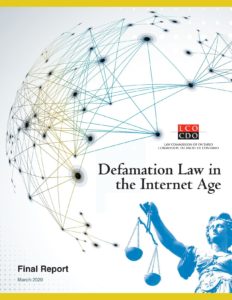 Project Purpose
Project Purpose
The Law Commission of Ontario’s Defamation Law in the Internet Age project examined Ontario’s defamation laws and how they should be updated to account for “internet speech,” including social media, blogs, internet platforms and digital media.
Defamation law protects reputation from harm caused by false words. The law tries to balance two fundamental, yet potentially conflicting, values: protection of reputation and freedom of expression.
Prior to the internet, defamation complaints typically focused on newspaper articles, books, magazines and radio and television broadcasts. The paradigm defendant was a professional media organization publishing in the public interest, and subject to professional journalism standards and other checks and balances. The common law of defamation and the Libel and Slander Act developed primarily to address the features of these cases.
The internet has led to new types of defamation claims, including vicious online personal attacks and false online reviews. Deep fakes, trolling, flaming and cyberbullying may all involve attacks on reputation. Online defamation is easily republished and hard to remove. It is also often anonymous, not subject to professional journalism standards and may not involve the public interest.
At present, there is no practical remedy for Ontarians victimized by online defamation.
Traditional defamation law does not provide practical procedures or remedies to resolve many online defamation cases. Court-based litigation is expensive and slow. As a result, practical alternatives are needed to address the problem of anonymous publishers and allow for the resolution of defamation claims “in real time” before extensive reputational harm occurs.
The LCO project involved the most extensive research and comprehensive consultations on defamation law undertaken in Canada. The project culminated in the release of our Final Report in March, 2020. The Final Report makes 39 recommendations to reform Ontario’s defamation laws in a broad range of areas.
Key Areas for Reform
The LCO’s Final Report makes 39 recommendations addressing Ontario’s Libel and Slander Act, the substantive law of defamation, publication, notice, limitation periods, injunctions, jurisdiction, takedowns, internet intermediaries and related issues.
The LCO’s major themes/findings include:
- At present, there is no practical legal remedy for Ontarians victimized by online defamation.
- Law reform is needed to modernize defamation and better protect freedom of expression in an online world. These reforms should build on successful common law developments and Ontario’s anti-SLAPP legislation.
- The Government of Ontario should introduce a new Defamation Act to promote access to justice and adapt defamation law to the realities of the internet, including social media, online personal attacks, false online reviews, “new media” organizations, anonymous publishers and internet intermediaries.
- The new Defamation Act should include new legal tools that promote faster, less expensive and better solutions for both traditional and online defamation complaints.
- Internet intermediary platforms hosting third party content accessible to Ontarians should have new legal responsibilities that address online defamation.
Major recommendations include:
- Ontario should introduce a new Defamation Act to promote access to justice and adapt defamation law to the realities of the internet. The new Act should include provisions:
- Encouraging alternative dispute resolution of online defamation disputes;
- Establishing a new notice regime for defamation complaints;
- Establishing a “single publication rule”;
- Establishing a two-year limitation period for defamation actions; and,
- Expanding courts’ authority to order interlocutory injunctions to takedown online content in limited, prescribed circumstances.
- The new Defamation Act should also establish new legal responsibilities for internet platforms that host third party content accessible to Ontarians. These duties should include obligations to:
- Pass on notice of defamation complaints to online publishers; and,
- Take down content if the publisher of the content does not respond to notice.
- Internet platforms that do not fulfil these duties should be liable for court fines. In order to protect free expression, intermediary platforms should not be considered publishers where they passively host third party content.
